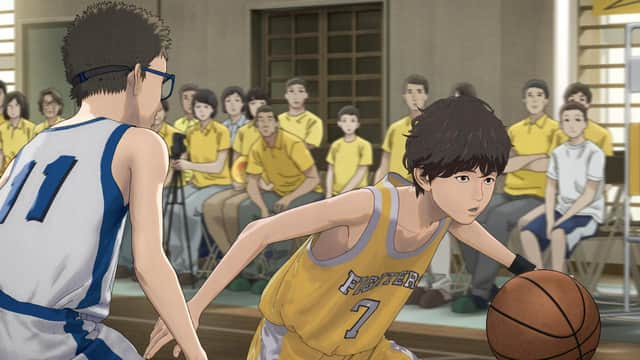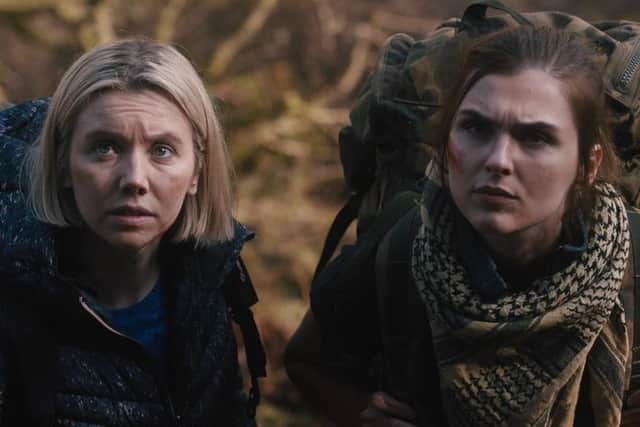Film reviews: The First Slam Dunk | Passages | Cobweb | Mercy Falls


The First Slam Dunk (12A) ****
Passages (18) ****
Cobweb (15) **
Mercy Falls (15) *
Sports movies thrive on clichés. It’s why the genre proves so durable, even for those agnostic about the sport in question, or sports in general. Good sports movie, though, often find ways to slyly disrupt their relatable triumph-over-adversity narratives. That’s certainly the case with animé hit The First Slam Dunk, a basketball drama about a rag-tag high school team taking on their undefeated rivals in an everything-to-play-for final.
Adapted by Takehiko Inoue from his own early-1990s manga series, the film may not be covering new ground thematically, but Inoue does take the novel step of dispensing with any build-up and filtering all the usual off-court drama through the action of a single championship game. Dramatically speaking it’s a welcome assist. Not only does it keep the film moving by capitalising on basketball’s end-to-end action and every-second-counts tension (vividly rendered using a mix of animation styles), it also plugs us more directly into the interior lives of the players as their respective demons manifest themselves in the moves they make during game time.
Advertisement
Hide AdOur tragedy-strewn entry point is Ryota Miyagi, a shorter-than-average player whose inferiority complex about never measuring up is fuelled by the childhood loss of his basketball prodigy older brother. Ryota’s efforts to come to terms with the latter provides the film with its beating heart, but as the film dribbles between his and his teammates’ various backstories, the visceral action of the championships deepens into a much more psychologically acute contest, especially as they have to launch the mother of all comebacks in the final quarter.


Full of explicit sex and raw emotions, the Paris-set Passages finds Love is Strange director Ira Sachs back on form after his disappointing bourgeois family drama Frankie. It stars the sensational Franz Rogowski as Tomas, a bad-boy German filmmaker whose determination to control his personal life with the same dictatorial authority he displays on set starts meeting resistance when he embarks on a lusty affair with Agathe (Adèle Exarchopoulos). Though he’s also in a somewhat open marriage with mild-mannered designer Martin (Ben Wishaw), his latest infidelity prompts Martin to end their gone-stale relationship, which sends Tomas into a tailspin as he keeps encroaching on Martin’s life while vigorously pursuing Agathe (her career as a teacher means she’s at least had some experience handling emotionally immature tantrum-throwers).
Part of what’s great about Sachs’ work, though, is that he never judges his characters. For all Tomas’s evident toxicity, he’s really a frightened child, fascinated by people but unable to understand them. Rogowski also makes him funny, especially when he stands-up for himself during an excruciating lunch with Agathe’s disapproving parents. They know he’s bad news, and deep down so do Agathe and Martin, who share an astonishing scene late on that underscores just how much damage he’s inflicted on both of them. And yet the film still can’t help but leave you feeling that Tomas’s biggest victim is himself. Passages is great like that. Awkward and truthful and alive to the chaos of real life.
In the last year or so there’s a been a welcome swing back to gnarly horror movies that prize actual tension and gore over respectable explorations of trauma. Even so, the blunt attempts that Cobweb makes to deliver effective jump scares might have benefited from at least some character development to make its rapid tonal shifts feel more natural and less like the filmmakers simply changed their minds about what kind of movie they wanted to make midway through.
Although Cobweb kicks off as a film about a nightmare-plagued kid discovering his house might really be haunted (the kid is played by C’mon, C’mon’s Woody Norman), debut feature director Samuel Bodin half-heartedly sets up and discards so many promising subplots involving his protagonist’s creepy parents (played by Lizzy Caplan and Antony Starr) that by the time he settles on delivering a J-horror inspired supernatural horror movie with a side-order of home-invasion nastiness (there’s a big nod to The Strangers), it’s hard to get invested in the outcome. It’s not without scares, but that just makes it all the more frustrating it’s not better.


Still, it’s The Evil Dead next to Mercy Falls, a risible Scottish wilderness survival thriller. It revolves around a group of friends hiking in the Highlands who get more than they bargained for when they invite a stranger to help them find the cabin in the woods one of them has inherited from their late father. Thinly conceived one and all, the characters are just mouthpieces for some pretty cringeworthy dialogue that’s by turns puerile, misogynistic and hilariously pretentious (this is the sort of film in which male characters refer to the women as “sluts”, but also declaim Homer to be “the godfather of storytelling”).
Advertisement
Hide AdThe plot hinges on a punch-up that rapidly escalates into a nonsensical and violent murder, yet none of the characters respond in ways that are remotely plausible. The villain’s improbable backstory, meanwhile, is revealed via a laughably signposted newspaper article and a honking flashback that provides no psychological insight beyond a generic PTSD diagnosis.
Co-writer/director Ryan Hendrick (who made the similarly woeful Lost at Christmas) perhaps deserves some credit for having the gumption to raise the finances and get a film made and into cinemas. But even with an established actor like Outlander’s Lauren Lyle in the lead, it’s all very amateur-hour and certainly lacks the gonzo energy of the best low-budget genre fare.
All films on general release now